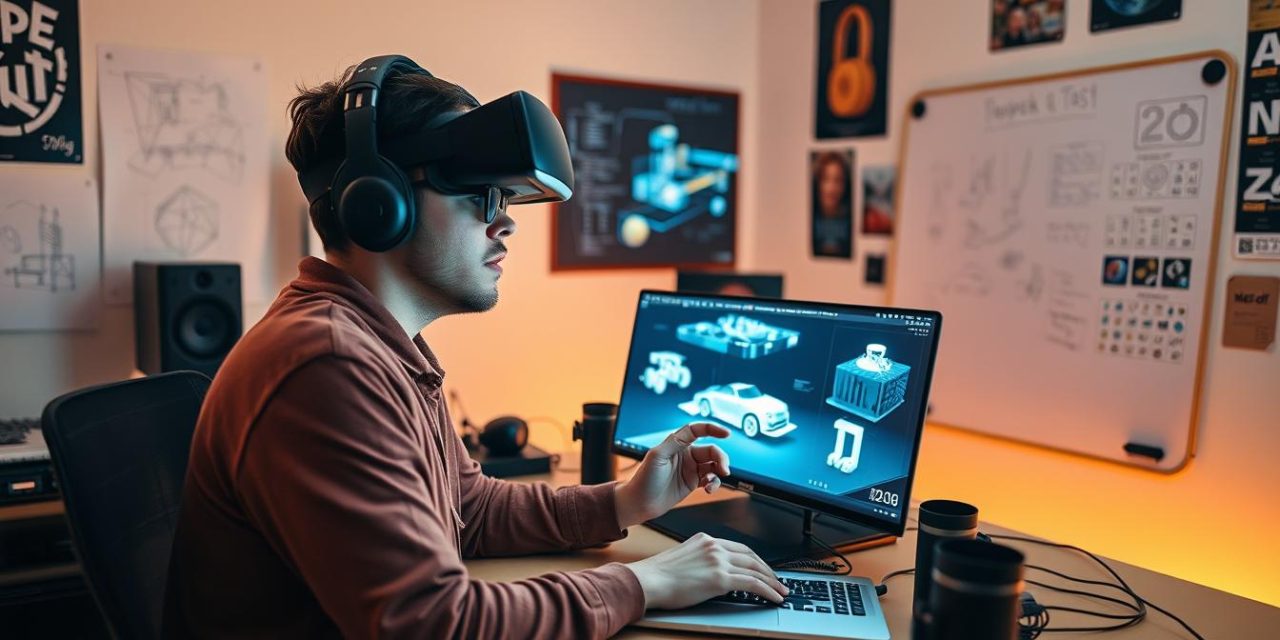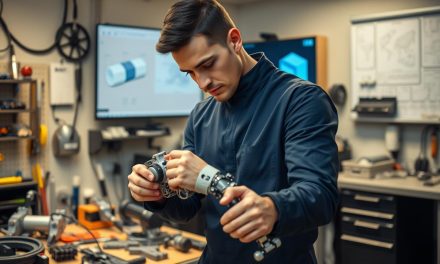Welcome to your complete guide on finding the perfect immersive technology specialist. Bringing your vision to life requires the right combination of technical skill and creative talent.
This section helps you understand why choosing someone with proven experience matters. The right professional can transform your concepts into engaging digital experiences.
We’ll explore how specialized knowledge in platforms like Unity drives project success. Effective communication and teamwork ensure your final product meets all requirements.
You’ll learn to evaluate candidates based on their portfolio and technical capabilities. From 3D modeling to animation, every detail contributes to outstanding results.
Table of Contents
Key Takeaways
- Finding skilled talent is crucial for creating successful immersive applications
- Technical expertise with development tools and platforms ensures quality results
- Clear communication and teamwork are essential for project success
- Evaluate candidates based on their portfolio and relevant experience
- Specialized knowledge in 3D modeling and animation enhances final products
- Understanding project requirements helps match with the right professional
- Proper talent selection leads to engaging digital experiences for users
Why Your Business Needs a Freelance AR/VR Developer
Companies today face growing pressure to innovate and stay ahead. Immersive technologies offer a powerful way to stand out and connect with audiences.
Hiring specialized talent helps you leverage these tools effectively. You gain access to cutting-edge skills without long-term commitments.
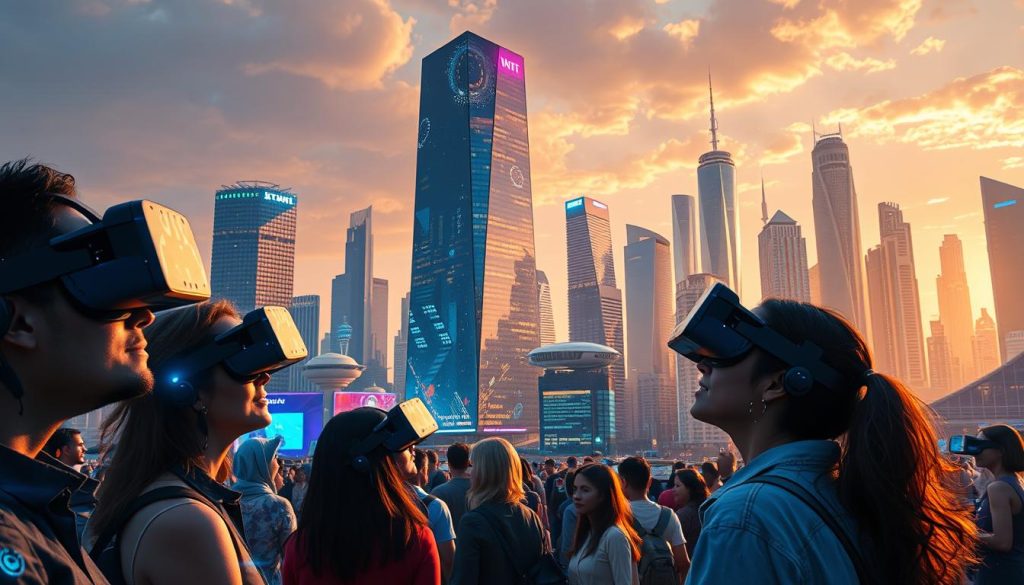
Market Growth and Industry Adoption Statistics
The global market for immersive tech is expanding rapidly. Projections show it reaching $450 billion by 2030, with nearly 40% annual growth.
Businesses across sectors report impressive benefits from adoption. Training time drops by 32%, while knowledge retention improves by 40%.
Customer engagement increases by 27% with these solutions. Error rates fall by 20%, boosting overall efficiency.
Competitive Advantages of Immersive Technology
These tools create strong emotional connections with users. They enable capabilities that were previously impossible or impractical.
Companies using immersive environments position themselves as innovation leaders. Remote expert guidance and realistic simulations transform how teams work.
Industries like healthcare, retail, and manufacturing see dramatic improvements. These solutions enhance product visualization and client interactions.
Investing in skilled professionals ensures your projects meet all technical requirements. Their expertise in platforms like Unity brings creative ideas to life.
You’ll develop applications that truly engage your audience and deliver memorable experiences.
Understanding AR vs VR Development: Key Differences
Navigating the world of immersive tech can feel overwhelming at first. Both technologies create amazing digital experiences but serve different purposes.
Knowing which path to choose helps your project succeed. This section breaks down the core similarities and differences between these two powerful tools.
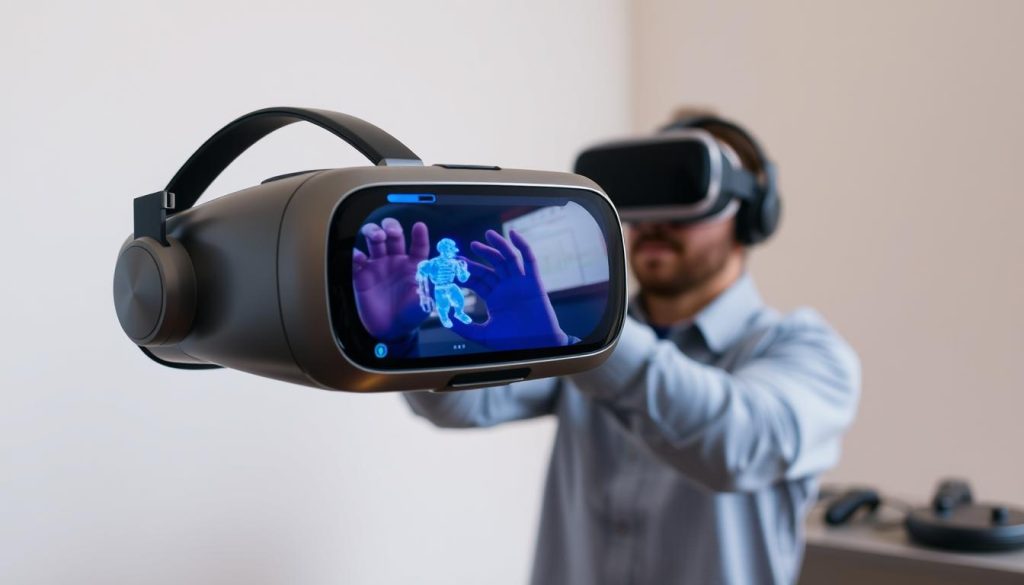
You’ll discover when each technology works best for specific applications. This knowledge helps you hire the right talent for your unique needs.
Core Technical Overlaps and Distinctions
Both technologies share important technical foundations. Specialists use similar tools and skills for both types of projects.
They commonly work with platforms like Unity and Unreal Engine. 3D modeling and spatial design skills apply to both environments.
Performance optimization remains crucial across all immersive applications. User experience design follows similar principles for both technologies.
| Aspect | Augmented Reality | Virtual Reality |
|---|---|---|
| Primary Focus | Blending digital content with real world | Creating fully immersive digital worlds |
| Key Technical Skills | Camera tracking, environmental understanding | Head tracking, motion sickness prevention |
| Hardware Requirements | Mobile devices, smart glasses | Dedicated headsets, motion controllers |
| User Interaction | Real-world environment enhancement | Complete digital environment interaction |
| Ideal Use Cases | Retail try-ons, maintenance assistance | Training simulations, architectural visualization |
When to Choose AR Development Specifically
Augmented reality works best when you want to enhance real-world settings. It overlays digital information onto physical environments.
Choose AR for mobile applications that provide practical utility. Retail try-ons and industrial maintenance assistance benefit greatly.
This technology excels at object recognition and real-time data overlay. It’s perfect for applications where users need information while interacting with their actual surroundings.
When VR Development Is the Right Choice
Virtual reality creates completely immersive digital environments. Users experience these through dedicated headsets and controllers.
Select VR for training simulations and therapeutic applications. Architectural visualizations and complex interactive experiences work beautifully.
This technology controls all environmental variables completely. It delivers powerful emotional experiences through total immersion.
Understanding these differences ensures you choose the right technology for your project. The correct choice leads to better user engagement and project success.
Essential Technical Skills to Look For in Developers
Identifying the right technical capabilities is crucial when selecting immersive technology professionals. The right skill set transforms your vision into engaging digital experiences that resonate with users.
Technical expertise forms the foundation of successful project outcomes. Specialists with comprehensive knowledge deliver solutions that meet your specific requirements.

Evaluating these competencies helps ensure your investment yields quality results. Look for professionals who demonstrate mastery across multiple technical domains.
Unity and Unreal Engine Proficiency
Game engines serve as the backbone of immersive application development. Unity remains the most popular choice for creating interactive experiences across platforms.
Unreal Engine offers powerful rendering capabilities for high-fidelity visual content. Both tools provide robust frameworks for building engaging digital environments.
Experienced professionals understand each engine’s unique features and limitations. They can recommend the best platform for your specific project needs.
Look for evidence of engine mastery in candidate portfolios. Successful projects demonstrate technical competence and creative problem-solving abilities.
3D Modeling and Animation Expertise
Creating believable digital worlds requires advanced 3D content creation skills. Modeling expertise ensures assets integrate seamlessly into interactive environments.
Animation knowledge brings characters and objects to life with realistic movement. These skills contribute significantly to user engagement and immersion quality.
Professionals should understand optimization techniques for different platforms. Efficient asset management ensures smooth performance across various devices.
Review portfolios for evidence of technical and artistic capabilities. Quality modeling and animation work demonstrates attention to detail and user experience considerations.
Platform-Specific Development Experience
Different hardware platforms present unique technical challenges and opportunities. Mobile AR development requires different approaches than dedicated headset experiences.
Platform-specific knowledge ensures optimal performance and compatibility. Specialists understand how to leverage each device’s capabilities effectively.
Experience with major platforms indicates adaptability and technical breadth. This versatility becomes valuable when projects span multiple delivery methods.
| Skill Category | Key Competencies | Platform Examples | Impact on Project Success |
|---|---|---|---|
| Engine Proficiency | Unity scripting, Unreal Blueprints, performance optimization | Cross-platform deployment | Determines application stability and feature implementation |
| 3D Content Creation | Modeling, texturing, rigging, animation principles | Asset store integration | Affects visual quality and user immersion level |
| Platform Specialization | ARKit/ARCore development, Oculus SDK, HoloLens integration | iOS, Android, dedicated headsets | Ensures device compatibility and optimal performance |
| Technical Optimization | Frame rate management, memory usage, battery conservation | All deployment environments | Critical for user experience and application reliability |
Technical skills directly influence your project’s final quality and user acceptance. Comprehensive expertise across these areas indicates a professional who can handle complex development challenges.
When evaluating candidates, prioritize those demonstrating balanced capabilities across engine proficiency, content creation, and platform specialization. This combination typically delivers the most successful project outcomes.
French clients particularly benefit from professionals who understand local market preferences and technical requirements. Regional expertise complements technical skills for truly effective solutions.
Finding the Perfect Freelance AR/VR Developer
French businesses seeking to create cutting-edge digital experiences need access to specialized platforms. The right hiring approach connects you with professionals who understand both technical requirements and creative vision.
This section explores the best methods for locating qualified talent in France. You’ll discover platforms that streamline the search process while ensuring quality matches.
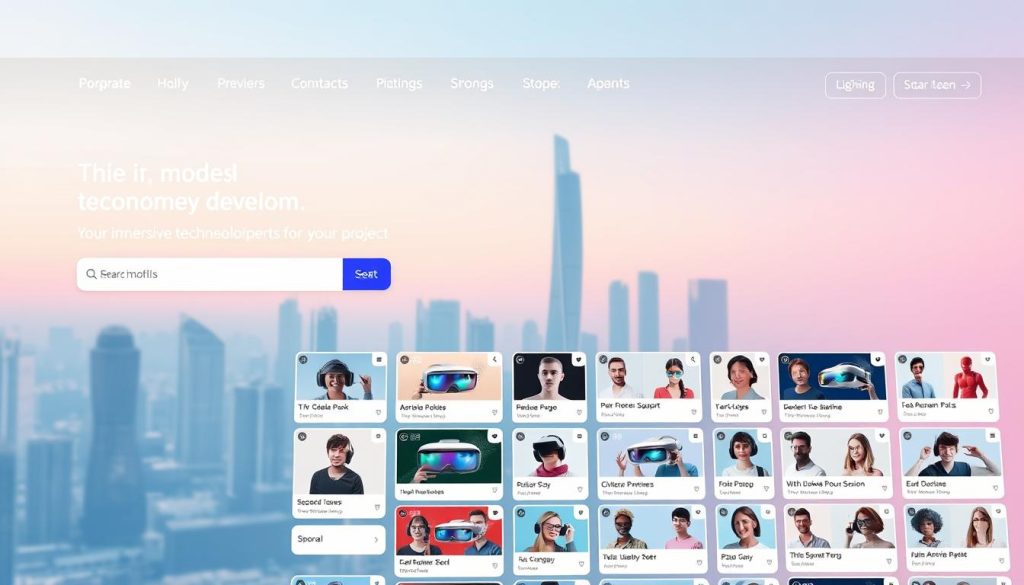
Top Platforms for Hiring in France
Several specialized services connect businesses with skilled professionals. PeoplePerHour stands out with comprehensive filtering options for experience levels and project types.
This platform lists remote opportunities with clear pricing structures. You can find specialists for everything from video production to complex application development.
Arc offers another excellent option with pre-vetted talent. Their selection process ensures high-quality professionals with proven Unity and Unreal Engine expertise.
These services help French clients access global talent while maintaining local. The right platform saves time and ensures better project outcomes.
Evaluating Developer Portfolios and Experience
Reviewing previous work provides crucial insights into a professional’s capabilities. Look for diverse projects that demonstrate technical breadth and creative problem-solving.
Strong portfolios showcase expertise across multiple platforms and technologies. They should include examples of 3D modeling, animation, and interactive environment creation.
Pay attention to how candidates present their problem-solving process. The best professionals explain their approach and demonstrate understanding of user engagement principles.
Communication skills matter as much as technical abilities. Look for evidence of successful collaboration and client satisfaction in previous projects.
This evaluation process ensures you select talent that aligns with your specific requirements. The right match leads to successful project completion and outstanding digital experiences.
Key Project Requirements to Define Before Hiring
Proper preparation prevents poor performance when working with technology experts. Taking time to outline your needs ensures everyone starts on the same page.
Clear requirements help specialists understand your vision completely. This planning phase saves time and prevents misunderstandings later.
Think about what you want to achieve with your immersive experience. Consider how users will interact with your final product.
Documenting these details helps you find the right talent for your specific needs. It also helps set realistic expectations for everyone involved.
Platform Compatibility Needs
Your choice of platform affects the entire development process. Different devices have unique capabilities and limitations.
Mobile devices offer wide accessibility but have processing constraints. Dedicated headsets provide deeper immersion with more powerful hardware.
Consider where your audience will use your application most. This decision impacts both the user experience and technical requirements.
Compatibility across multiple platforms might be necessary. This approach reaches more users but requires additional development work.
Technical Specifications and Features
Detail the specific elements your project needs to include. 3D assets and animations bring your digital world to life.
Interactive features like object manipulation engage users deeply. UI panels help navigate complex environments smoothly.
Consider performance requirements for optimal user experience. Frame rates and loading times affect how people perceive your product.
Integration with existing systems might be necessary. Data connectivity expands your application’s usefulness significantly.
Budget and Timeline Considerations
Realistic financial planning ensures your project stays on track. Costs vary based on complexity and specialist experience levels.
Fixed-price arrangements work well for clearly defined projects. Hourly rates suit evolving requirements that need flexibility.
Timelines should account for testing and refinement phases. Rushing these stages often leads to quality issues later.
Remember that experienced professionals might charge higher rates. Their expertise often saves time and delivers better results overall.
Planning these elements carefully sets your project up for success. Clear requirements help your team work efficiently toward shared goals.
Communication and Collaboration Best Practices
Working with creative professionals requires more than technical skills. Clear communication forms the foundation of successful project outcomes. It ensures everyone understands goals and expectations from day one.
Effective collaboration transforms good ideas into exceptional digital experiences. When teams work well together, they create solutions that truly engage users.
This section explores practical strategies for working with specialized talent. You’ll discover how to maintain alignment throughout your project’s lifecycle.
Establishing Clear Project Milestones
Breaking projects into manageable phases keeps everyone focused. Milestones create natural checkpoints for reviewing progress and adjusting direction.
Define specific deliverables for each phase of your work. This approach helps teams understand what success looks like at every stage.
Regular progress reviews ensure your project stays on schedule. They provide opportunities to address challenges before they become problems.
Celebrating completed milestones boosts team morale and motivation. It reinforces positive momentum throughout the development process.
Tools for Effective Remote Collaboration
Modern technology offers powerful solutions for distributed teams. Git provides excellent version control for code management and collaboration.
Communication platforms like Slack enable real-time discussions and file sharing. Video conferencing tools maintain personal connections across distances.
Project management software helps track tasks and deadlines effectively. These tools provide visibility into progress for all team members.
Cloud storage solutions ensure everyone accesses the latest files and assets. They simplify sharing large project files across different locations.
« The most successful projects combine technical excellence with seamless teamwork. Regular communication turns individual contributions into cohesive experiences. »
Maintaining regular check-ins keeps everyone aligned with project goals. Weekly meetings provide opportunities to share updates and address questions.
Encourage open dialogue about challenges and potential improvements. The best ideas often emerge through collaborative problem-solving.
Document decisions and action items to ensure clarity and accountability. Written records prevent misunderstandings and keep projects moving forward.
These practices help French clients manage international talent effectively. They bridge cultural and geographical differences through structured collaboration.
Successful partnerships combine technical expertise with strong interpersonal skills. They create environments where creativity and innovation thrive.
When teams communicate effectively, they deliver better products faster. Users enjoy more engaging and polished final experiences.
Implementing these strategies ensures your project meets all technical requirements. It also builds relationships that can lead to future successful collaborations.
Pricing Structures for Freelance AR/VR Development
Budget planning for immersive technology projects requires careful consideration of various pricing models. Understanding different structures helps you allocate resources effectively while ensuring quality results.
This section explores common pricing approaches used by professionals in France. You’ll learn how to match payment models with your specific project needs and timeline.
Hourly vs Fixed-Price Projects
Hourly rates work best for projects with evolving requirements or uncertain timelines. This model offers flexibility when features might change during development.
Professionals typically track time using specialized tools that provide transparent reporting. Clients pay only for actual work completed, which can benefit smaller projects.
Fixed-price agreements suit well-defined projects with clear specifications. Both parties agree on a set fee for delivering specific features and functionality.
This approach provides budget certainty but requires detailed planning upfront. Changes to scope usually require additional negotiations and adjustments.
Experience Level Pricing Tiers
Specialist rates vary significantly based on their expertise and track record. More experienced professionals command higher fees but often deliver better results faster.
Entry-level talent offers affordable options for simpler projects or prototypes. They typically have 0-2 years of practical experience with immersive technologies.
Intermediate specialists bring 2-5 years of hands-on work with various platforms. They handle moderately complex projects requiring broader technical knowledge.
Expert professionals possess 5+ years of experience tackling challenging assignments. Their deep understanding of tools and user engagement principles justifies premium rates.
| Experience Level | Daily Rate Range | Ideal Project Types | Technical Capabilities |
|---|---|---|---|
| Entry-Level | €150 – €300 | Prototypes, basic applications | Fundamental engine knowledge, simple modeling |
| Intermediate | €300 – €500 | Moderate complexity applications | Platform specialization, animation skills |
| Expert | €500 – €700+ | Complex systems, enterprise solutions | Advanced optimization, team leadership |
Understanding Value vs Cost
Smart budgeting involves evaluating more than just hourly rates or project quotes. Consider the long-term value a specialist brings to your digital experience.
Highly skilled professionals might seem expensive initially. Their expertise often reduces development time and prevents costly errors.
Platforms like PeoplePerHour and Arc help French clients find affordable yet skilled developers for various project types. Global hiring options can reduce costs by up to 58% compared to traditional local hiring.
Balance your budget against the technical requirements and features needed for success. Complex applications with advanced animation and modeling naturally cost more.
« The cheapest option often becomes the most expensive choice when quality suffers. Invest in talent that delivers lasting value rather than just low initial costs. »
Evaluate candidates based on their portfolio quality and problem-solving abilities. Great professionals demonstrate understanding of user engagement and technical best practices.
Consider project timeline and communication needs when selecting pricing models. Fixed-price works well for tight deadlines, while hourly rates suit evolving projects.
French businesses benefit from professionals who understand local market preferences. Regional knowledge complements technical skills for truly effective solutions.
Ultimately, smart pricing decisions help you achieve project vision efficiently. They ensure you get quality results without overspending your budget.
Conclusion: Bringing Your Immersive Vision to Life
You now have the knowledge to turn your innovative ideas into reality. This guide has shown how finding skilled talent transforms concepts into engaging digital experiences.
Understanding market growth and technical requirements leads to successful projects. Platforms in France connect you with experts who master tools like Unity.
Clear communication and defined goals ensure your team delivers outstanding results. With the right specialist, your product will captivate users and drive engagement.
Ready to begin? Use these insights to find your perfect immersive technology partner today. Your vision deserves expert execution.
We wish you tremendous success creating memorable experiences for your audience!
FAQ
What’s the difference between AR and VR?
Augmented Reality (AR) adds digital elements to your real-world view, while Virtual Reality (VR) creates a completely immersive digital environment. Think Pokémon Go for AR and Oculus Rift for VR.
How do I know if my project needs AR or VR?
Choose AR for enhancing real-world experiences like retail or navigation. Pick VR for fully immersive training, gaming, or simulation where users need complete digital immersion.
What technical skills should I look for in a developer?
Look for strong Unity or Unreal Engine skills, 3D modeling and animation experience, and knowledge of specific platforms like iOS ARKit, Android ARCore, or Meta Quest development.
Where can I find qualified developers in France?
Popular platforms include Malt, Comet, and LinkedIn. These sites feature vetted professionals with portfolio examples and client reviews to help you make informed choices.
What should I include in my project requirements?
A> Define your target platforms, must-have features, budget range, and timeline. Clear requirements help developers understand your vision and provide accurate proposals.
How should I communicate with remote developers?
Use tools like Slack for daily communication, Trello for task management, and regular video calls. Establish clear milestones to keep projects on track and ensure everyone stays aligned.
What are typical pricing structures for these projects?
Developers may charge hourly rates or fixed project fees. Pricing varies by experience level – junior developers cost less while experts command higher rates for complex work.
How do I evaluate a developer’s portfolio?
Look for projects similar to yours, check user experience quality, and examine technical execution. Don’t hesitate to ask for references or demos of their previous work.

